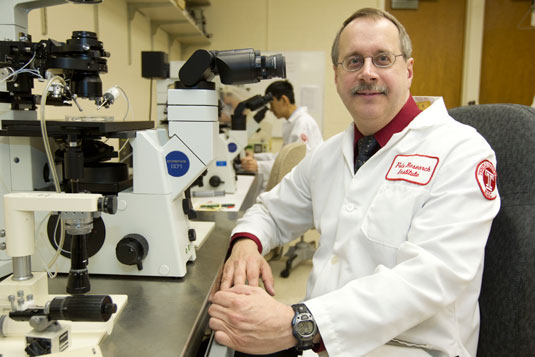Developmental biologist seeks

Keith Latham loves biology. In particular, it’s the study of how organisms grow and develop — developmental biology — that has ignited his passion as a researcher for more than 20 years.
“I just developed a very keen interest in the many varieties of living organisms and the many different ways organisms have found to solve a common set of problems,” said Latham, a professor of biochemistry and a professor in the Fels Institute for Cancer Research and Molecular Biology in Temple’s School of Medicine. “Developmental biology, to me, just really encompasses all of the life sciences.”
A member of the School of Medicine faculty and Fels Institute researcher since 1992, his work focuses on mechanisms that control early development, primarily early mammalian developmental biology.
“The first few days of life are really crucial because this whole new developmental program is starting,” said Latham, recipient of the 2011 Faculty Research Award. “Fertilization ‘flips that magic switch’ and starts a whole new life.”
Highly respected within the developmental biology field, Latham has been described as a “well-established leader” who is “held in high regard by his international peers.” His work has been funded by the National Institutes of Health, the National Science Foundation and private foundations.
“My research has really benefitted from my being located here in Philadelphia, because this city is a hub for developmental biology,” said Latham.
“My position at Fels has been a real asset to my research,” he said. “The institute has provided all the support and opportunities I’ve ever needed. Just having a great environment like this to work in is priceless.”
Latham said that beyond receiving funding to do your work, success takes persistence, creativity and a lot of hard work.
“Often, the words creativity and science are not generally used in the same sentence,” he said. “But I really think there is a strong creative component to doing research.
“Nothing is more satisfying as a scientist than identifying a question, developing a strategy for designing experiments, obtaining the resources to carry out those experiments, getting the results then drawing your conclusions and realizing you have learned something new about the natural world,” he added. “Any scientist will tell you, that is why they stay in the business. That’s the reward.”